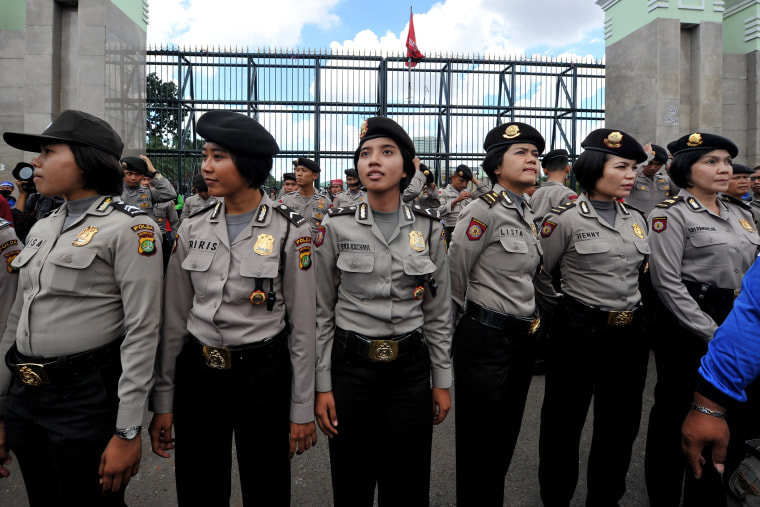The nonprofit Human Rights Watch is taking aim at a sexist, decades-old procedure practiced throughout Indonesia in which the country's National Police require women to undergo a "virginity test" as part of their application to the force.
In a report published Tuesday, the international organization called on the Indonesian government to demand law enforcement authorities end the procedure, which purports to determine whether a woman is a virgin. HRW representatives report the practice has been in place within Indonesia since 1965, and likely has affected thousands of women.
"Women have been too ashamed or traumatized to talk about it for decades."'
"The fact that this practice is really only coming to light now indicates how humiliating, shameful, and taboo this procedure has been for women in Indonesia," Phelim Kine, HRW's deputy director of the Asia Division, told msnbc. “Women have been too ashamed or traumatized to talk about it for decades."
Kine said the national force is in the midst of an unprecedented effort to recruit women officers. They are seeking to increase the number of women in the ranks by thousands by the end of the year to better deal with cases of sexual and domestic violence.
But the virginity test requirement is a deterrence for attracting candidates, Kine added, and HRW is questioning the reasoning behind the decision to proceed with such a practice.
"This is absolutely abusive, discriminatory, and degrading," he said. "For those who attempt this test is an absolutely outrageous violation of their physical integrity and a painful and degrading process that they should not have to endure."
HRW discovered the practice through contact with non-governmental organizations in Indonesia that assist women who have undergone the procedure. Between May and October of this year, the organization interviewed women who are on the force or applying for a position in six Indonesian cities. Candidates who "failed" weren't necessarily fired from the force, but many described the procedure as painful and traumatic, according to the report.
HRW is seeking to meet with key officials of the Indonesian government and national police to secure a commitment that this test will be ended immediately. Members found little evidence that the national police are currently attempting to end the procedure. The International Association of Women Police is also looking into the practice.
HRW doesn't believe the test is applied in other Indonesian agencies. But the organization has documented similar practices in Afghanistan and India, where officials use the procedure, known as the "two-finger test," during investigations of alleged sexual violence, Kine said. The practice aims to determine whether a rape survivor is "habituated to sex," he added, which could result in the dismissal of charges against a person accused of rape.
Last April, the Supreme Court of Indonesia condemned the test, saying it violated women's rights to privacy and dignity. HRW is hoping advocacy in Afghanistan will produce similar results.
Kine acknowledged that changing a practice deeply rooted in a society can be a long process. But representatives hope the fight will end quickly in Indonesia because it doesn't involve convening parliament or changing a law -- instead, it only requires the police force to decide the practice is unacceptable.
"Indonesia is this self-style, rising regional power, and it needs to recognize that in the 21st-century international community, the types of abuses symbolized by virginity tests are simply unacceptable," Kine said. "The government needs to take action to demonstrate its opposition to such abuses and its support for its right for women."
